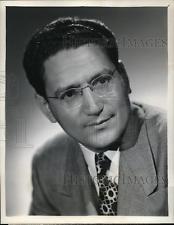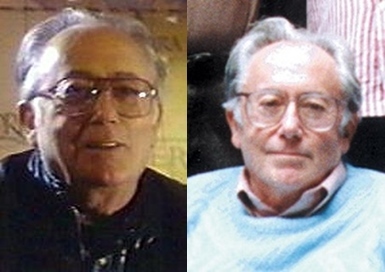(This article will be published on facebook too)
[url]http://imageshack.us/photo/my-images/834/johndoe1.gif/[/url] [size=12pt]Who is Albert Band ?[/size]
Albert Band was an American director, producer and writer, who was involved in a handful of spaghetti westerns. He was born in 1924, in Paris. So far, there’s no discussion.
It’s also confirmed that he worked in Hollywood in the late forties, early fifties. He directed his own Hollywood western in 1956, The Young Guns. In the late fifties he went back to Europe, and was involved in the production of five spaghetti westerns, among them the key movie Duello nel Texas (1963), co-produced by Jolly Films, the company of Arrigo Colombo and Giorgio Papi, who would produce, one year later, the film that changed everything, Per un Pugno di Dollari. Band’s next project was Massacro al Grande Canyon, now best known as the first western (co-)directed by Sergio Corbucci. Band and Corbucci would meet again on the set of I Crudeli (The Hellbenders), the first as producer, the second as director, a loose sequel to Band’s Gli Uomini dal Passo Pesante (The Tramplers). Band also contributed to the script of Un Minute per Pregare, un Istante per Morire (A Minute to Pray, a moment to Die), directed by Franco Giraldi).
The problem is that are three readings of this history, an Italian one (sustained by Marco Giusti, several other Italian sources and IMDB, and supported by me in the various reviews of Band’s movies) and an American one, brought up in reaction to the reviews, by William Connolly. The third one, is a mix of these two.
# The three versions
According to the Italian version, Band was an ‘Italo-americano’, an American of Italian descent, born as Alfredo Antonini. On facebook, William Connolly denied that Albert Band’s real name was Alfredo Antonini. He claims that Band told him, shortly before his death in 2002, that he didn’t know where the name Antonini came from. It was suggested that somebody had mixed him up with a crew member of that name, and that the mistake had been copied by many others. The name Albert Band would also appear on his birth certificate. So in this version the director was born (still in Paris, in 1924) as Albert Band to his father, Max Band, a landscape artist, who was born, in 1901, not in Italy, but in Lithuania. Albert Band had two children, Charles and Richard, who both work within the film industry, Charles as a writer, producer and director of horror movies, Richard as a film composer. The blog ‘WesternsallItaliana’ offers a sort of blend of these theories: it is suggested that Band used Antonini as a pseudonym. So in this version, he was doing the direct opposite of the Italians in the business: while they were Americanizing their names, he was Italianating his. It seems far-fatched, but as we shall see it’s not impossible.
# Some questions
At first sight the American version seems the most likely. Mistakes are easily made and often start living their own life, and it also seems unlikely that a family called Antonini would Americanize its name into Band. Anthony would have been a more likely choice. But there are a few problems. Giusti has spoken to several people who have worked with the man, and according to them Band spoke Italian rather well. This seems to suggest an Italian background. Americans of Italian descent usually are very proud of their family origins and often have a good knowledge of the Italian language. Younger generations are more reluctant to study the ‘difficult foreign language’ Italian is to them, but if they can afford it, their parents send them to Rome or Florence, to study the language in one of the many language schools or ‘summer universities’. At the same time the study of Italian is not very popular among people without any historic bond with the country. So where and why did he learn Italian? Was his mother by any chance Italian? Was her family name Antonini and did he use it as a pseudonym (probably by means of introduction within the Italian film business)?
This brings me to another aspect of this story: it seems unlikely that an American director without any Italian background, would get involved in these early spaghetti westerns. If he spoke no Italian, such a person would also have had a difficult time, since few Italians spoke any English in those days. According to Giusti, Band dreamt of bringing the western genre to his home country. Now that makes sense.
# The Name and the certificate
The name Band is not Italian, and it doesn’t sound Russian either. In the first half of the 20th Century, people who settled down in another country, often changed their names, because they thought the new name would help them to be accepted in their new homeland, or (mainly in the case of Jews) to hide their ethnic or religious background. One link (comments on painter Max Band’s work) seems to suggest that the family had a Jewish background. Families moving to America often had only a rudimentary knowledge of the English language (in the first half of the 20th Century French was more common than English in Europe) and occasionally chose English names that were easy to the eye or to the tongue.
And then this birth certificate. It’s my experience that people know surprisingly little of their own background. Four cousins will often tell you different stories about the history of the family. In France, where Band was born, original certificates are kept in the place of birth and official copies aren’t easy to obtain. In the first half of the 20th century, there was a lively trade in false birth certificates, and this was perfectly understandable. Most European countries were (and still are) bureaucracies, and official copies of birth certificates weren’t (and still aren’t) easy to obtain. In France, where Band was born, a birth certificate, un acte the naissance, is an authentic legal certificate, that must be signed by an official Civil Service agent. Moreover official copies have only a limited validity. Many people in need of a certificate, didn’t know how to obtain an official copy and therefore chose for an unofficial one, that was, so to speak ‘officialized’ on American soil: from this moment on, the forged copy became the real one. So even if his name was on his birth certificate, we can’t be sure that Albert Band was his real – or original – name.
# Interim report
I tell you all this to illustrate how complicated these matters are. It wouldn’t surprise me if we got some conflicting comments, with various people sustaining that their version is absolutely right. All comments are of course more than welcome. Seize matters, details too, and we can at least try to get to the bottom of this.

 [/url]
[/url]